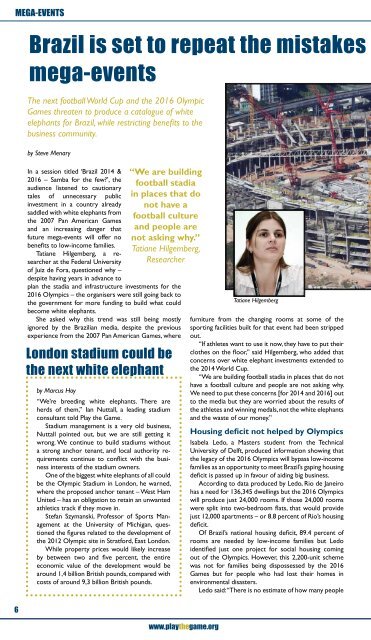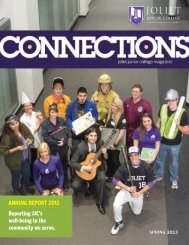playthegame - UniFlip
playthegame - UniFlip
playthegame - UniFlip
You also want an ePaper? Increase the reach of your titles
YUMPU automatically turns print PDFs into web optimized ePapers that Google loves.
MEGA-EVENTS<br />
6<br />
Brazil is set to repeat the mistakes o<br />
mega-events<br />
The next football World Cup and the 2016 Olympic<br />
Games threaten to produce a catalogue of white<br />
elephants for Brazil, while restricting benefits to the<br />
business community.<br />
by Steve Menary<br />
“We are building<br />
football stadia<br />
in places that do<br />
not have a<br />
football culture<br />
and people are<br />
not asking why.”<br />
Tatiane Hilgemberg,<br />
Researcher<br />
In a session titled ‘Brazil 2014 &<br />
2016 – Samba for the few?’, the<br />
audience listened to cautionary<br />
tales of unnecessary public<br />
investment in a country already<br />
saddled with white elephants from<br />
the 2007 Pan American Games<br />
and an increasing danger that<br />
future mega-events will offer no<br />
benefits to low-income families.<br />
Tatiane Hilgemberg, a researcher<br />
at the Federal University<br />
of Juiz de Fora, questioned why –<br />
despite having years in advance to<br />
plan the stadia and infrastructure investments for the<br />
2016 Olympics – the organisers were still going back to<br />
the government for more funding to build what could<br />
become white elephants.<br />
She asked why this trend was still being mostly<br />
ignored by the Brazilian media, despite the previous<br />
experience from the 2007 Pan American Games, where<br />
London stadium could be<br />
the next white elephant<br />
by Marcus Hoy<br />
“We’re breeding white elephants. There are<br />
herds of them,” Ian Nuttall, a leading stadium<br />
consultant told Play the Game.<br />
Stadium management is a very old business,<br />
Nuttall pointed out, but we are still getting it<br />
wrong. We continue to build stadiums without<br />
a strong anchor tenant, and local authority requirements<br />
continue to conflict with the business<br />
interests of the stadium owners.<br />
One of the biggest white elephants of all could<br />
be the Olympic Stadium in London, he warned,<br />
where the proposed anchor tenant – West Ham<br />
United – has an obligation to retain an unwanted<br />
athletics track if they move in.<br />
Stefan Szymanski, Professor of Sports Management<br />
at the University of Michigan, questioned<br />
the figures related to the development of<br />
the 2012 Olympic site in Stratford, East London.<br />
While property prices would likely increase<br />
by between two and five percent, the entire<br />
economic value of the development would be<br />
around 1,4 billion British pounds, compared with<br />
costs of around 9,3 billion British pounds.<br />
www.<strong>playthegame</strong>.org<br />
Tatiane Hilgemberg<br />
furniture from the changing rooms at some of the<br />
sporting facilities built for that event had been stripped<br />
out.<br />
“If athletes want to use it now, they have to put their<br />
clothes on the floor,” said Hilgemberg, who added that<br />
concerns over white elephant investments extended to<br />
the 2014 World Cup.<br />
“We are building football stadia in places that do not<br />
have a football culture and people are not asking why.<br />
We need to put these concerns [for 2014 and 2016] out<br />
to the media but they are worried about the results of<br />
the athletes and winning medals, not the white elephants<br />
and the waste of our money.”<br />
Housing deficit not helped by Olympics<br />
Isabela Ledo, a Masters student from the Technical<br />
University of Delft, produced information showing that<br />
the legacy of the 2016 Olympics will bypass low-income<br />
families as an opportunity to meet Brazil’s gaping housing<br />
deficit is passed up in favour of aiding big business.<br />
According to data produced by Ledo, Rio de Janeiro<br />
has a need for 136,345 dwellings but the 2016 Olympics<br />
will produce just 24,000 rooms. If those 24,000 rooms<br />
were split into two-bedroom flats, that would provide<br />
just 12,000 apartments – or 8.8 percent of Rio’s housing<br />
deficit.<br />
Of Brazil’s national housing deficit, 89.4 percent of<br />
rooms are needed by low-income families but Ledo<br />
identified just one project for social housing coming<br />
out of the Olympics. However, this 2,200-unit scheme<br />
was not for families being dispossessed by the 2016<br />
Games but for people who had lost their homes in<br />
environmental disasters.<br />
Ledo said: “There is no estimate of how many people

















